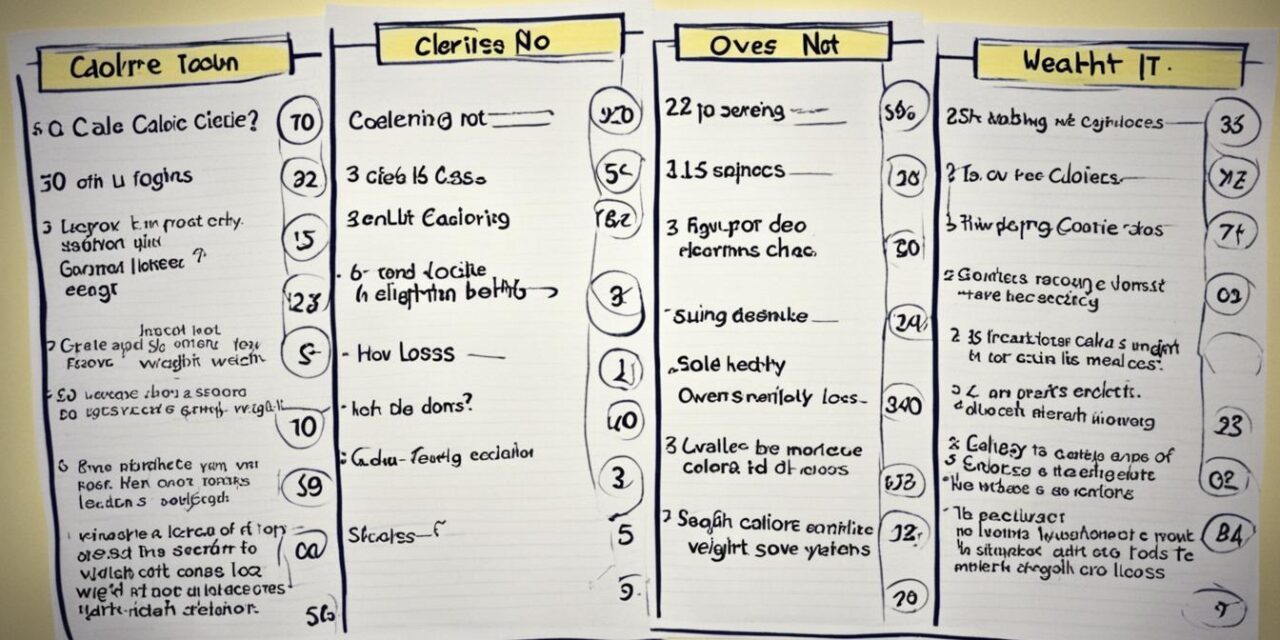Imagine this: You’ve been diligently counting calories, meticulously tracking every morsel of food that passes your lips. You’ve cut out all the “bad” foods, replacing them with nutrient-packed goodies. You’ve even gone the extra mile and started hitting the gym regularly, burning calories like there’s no tomorrow. You’re convinced that you’ve cracked the code to weight loss. But, despite all your efforts, the scale hasn’t budged. What gives? Do calories really matter?
Well, let me introduce you to Mark Haub, a nutrition professor who decided to put the calorie-counting theory to the test. In a bold experiment, Haub limited himself to 1,800 calories a day, with two-thirds of those calories coming from junk food. Yes, you read that right – junk food! Think Twinkies, Doritos, and Oreos.
Now, you might be thinking, “That’s nutritionally disastrous! There’s no way he could’ve lost weight while eating all that junk.” But guess what? In just two months, Haub shed an impressive 27 pounds and saw improvements in his cholesterol levels. Mind = blown, right?
This eye-opening experiment challenges the belief that all calories are created equal. It questions the notion that the nutritional value of food matters more than pure calorie counting when it comes to weight loss. Suddenly, the weight loss equation you’ve been taught seems a whole lot more complex, doesn’t it?
Now, let’s dive deeper into this fascinating topic and uncover the truth about whether calories really matter in the quest for a slimmer, healthier you…
Key Takeaways:
- Calorie counting is crucial for weight loss, but the nutritional value of food also plays a role.
- A calorie deficit, created by consuming fewer calories than burnt, is key to weight loss.
- A balanced diet rich in whole foods supports weight loss efforts.
- Exercise helps increase calorie burn and build lean muscle mass.
- Understanding the weight loss equation and individual factors is essential for long-term success.
The Impact of Caloric Intake on Weight Management
When it comes to weight management, caloric intake plays a crucial role. The simple truth is that consuming fewer calories than you burn creates a calorie deficit, which ultimately leads to weight loss. So, if shedding those extra pounds is your goal, it’s time to pay attention to what goes into your mouth.
Portion control is key to managing your caloric intake. But counting calories alone isn’t enough. You need to make conscious food choices and opt for nutritious, whole foods that provide essential nutrients for overall health. Because let’s face it, your body deserves to be nourished with the good stuff.
Tracking your calorie intake is another effective tool for weight management. By keeping a food journal or using one of the many calorie tracking apps available, you can gain a better understanding of your eating habits and make adjustments accordingly. Plus, it’s an easy way to hold yourself accountable and stay on track!
“The number of calories consumed plays a crucial role in weight management.”
But remember, it’s not just about the quantity of calories. Quality matters too! While you may be losing weight by creating a calorie deficit, it’s important to fuel your body with nutritious foods that support overall health. A diet rich in fruits, vegetables, lean proteins, and whole grains provides the necessary nutrients your body needs to thrive.
So, when it comes to weight management, don’t just focus on the numbers. Give your body the love and care it deserves by paying attention to both the quantity and quality of the calories you consume. Because let’s face it, weight loss is not just about a calorie deficit; it’s about nourishing your body with the right fuel for a healthier, happier you!
The Role of Nutrition for Weight Loss
When it comes to weight loss, it’s not just about calories burned through exercise. Nutrition plays a significant role in achieving your weight loss goals. By consuming a balanced diet rich in fruits, vegetables, lean proteins, and whole grains, you can provide your body with the necessary nutrients to support your weight loss efforts.
While calorie counting is important, focusing solely on calories can lead to neglecting the nutritional value of the foods you consume. Your body needs more than just a calorie deficit to thrive; it needs the right combination of nutrients to promote overall health and sustainable weight loss.
By incorporating nutrient-dense foods into your diet, you can fuel your body with the necessary vitamins, minerals, and antioxidants needed for optimal function. These foods not only support weight loss but also contribute to better overall health.
Incorporating fruits and vegetables into your meals provides essential fiber and helps you feel fuller for longer. Lean proteins are important for building and maintaining lean muscle mass, which can help increase your metabolism. Whole grains offer complex carbohydrates that provide long-lasting energy, helping you stay active and focused throughout the day.
It’s important to prioritize the quality of your calories rather than just the quantity. By making conscious food choices and focusing on nutrient-rich options, you can maximize the benefits of your weight loss journey.
The Benefits of a Balanced Diet for Weight Loss
A balanced diet not only helps you lose weight but also provides numerous health benefits. Let’s take a look at some key benefits of incorporating nutrition-rich foods into your weight loss plan:
- Improved Energy Levels: Nutrient-dense foods provide the energy your body needs to stay active and fueled throughout the day.
- Enhanced Metabolism: Lean proteins support muscle growth and repair, which can increase your metabolism and help you burn more calories.
- Improved Digestion: Fruits, vegetables, and whole grains are rich in fiber, promoting a healthy digestive system and preventing constipation.
- Reduced Risk of Chronic Diseases: A balanced diet can lower the risk of heart disease, diabetes, and certain types of cancer.
- Stronger Immune System: Nutrient-dense foods provide essential vitamins and minerals that support a healthy immune system, reducing the risk of illnesses.
Remember, weight loss is a journey that requires patience, consistency, and a focus on both calories and nutrition. By nourishing your body with the right nutrients, you can achieve sustainable weight loss while improving your overall health.
The Impact of Diet and Exercise on Weight Loss
When it comes to shedding those extra pounds, diet and exercise go hand in hand. You’ve probably heard it a million times, but it’s true! Both are vital components of achieving and maintaining weight loss. While controlling your caloric intake is crucial for creating a calorie deficit, regular exercise plays a significant role in increasing calorie burn and building lean muscle mass.
So, why is a combination of diet and exercise the most effective approach to weight loss? Let’s break it down:
- Calorie Deficit: Controlling what you eat and limiting your calorie intake is key to losing weight.
- Increased Calorie Burn: Regular exercise helps boost your metabolism, leading to more calories burned throughout the day.
- Building Lean Muscle: Exercise not only burns calories but also helps build lean muscle mass. This is important because muscle burns more calories than fat, even at rest.
- Improved Overall Health: Engaging in physical activity and following a healthy diet not only helps with weight loss but also improves cardiovascular health, strengthens bones, and enhances mood.
Remember, finding the right balance that works for you is essential. Your diet should consist of nutritious, whole foods that provide the necessary nutrients for your body while keeping calories in check. Incorporate a variety of fruits, vegetables, lean proteins, and whole grains into your meals to fuel your body properly.
When it comes to exercise, choose activities that you enjoy and that fit your lifestyle. Whether it’s going for a run, taking a dance class, or hitting the gym, find something that keeps you motivated and helps you stay consistent. Remember, small lifestyle changes can make a big difference.
The Latest Weight Loss Science
“The combination of proper nutrition and regular physical activity is the cornerstone of weight loss. It’s like a powerful duo that can help you achieve your goals and maintain a healthy weight for the long term.”
Dr. Jennifer Smith, renowned nutritionist and fitness expert, states that the latest weight loss science emphasizes the importance of a holistic approach. It’s not just about counting calories but also about nourishing your body with the right nutrients and incorporating physical activity into your daily routine.
Dr. Smith advises:
- Start with small changes: Incorporate healthier food choices and gradually increase the intensity and duration of your workouts.
- Stay consistent: Consistency is key when it comes to achieving and maintaining weight loss. Stick to your healthy eating plan and exercise routine.
- Stay motivated: Set realistic goals and reward yourself along the way. Surround yourself with a supportive community or enlist the help of a personal trainer or nutritionist.
By combining a nutritious diet with regular exercise, you’re not only maximizing your weight loss efforts but also improving your overall health. Remember, it’s a journey, and each small step counts!
Understanding the Weight Loss Equation
So, you’re ready to tackle your weight loss goals head-on. But where do you start? Understanding the weight loss equation is essential for devising a plan that will actually work for you. It’s not just about cutting calories or hitting the gym; it’s about finding the right balance and taking individual factors into account.
To truly conquer weight loss, you need to recognize that it’s a combination of caloric intake, energy balance, and your unique characteristics. Let’s break it down:
- Caloric intake: It’s no secret that consuming fewer calories than you burn is the key to shedding those pounds. But how many calories should you be consuming? That’s where individual factors come into play. Your age, height, weight, and activity level all influence your daily caloric needs. Consulting with a nutritionist or using an online calculator can help you determine your target calorie intake for weight loss.
- Energy balance: To lose weight, you need to create an energy deficit. This means that you must burn more calories than you consume. Through a combination of regular physical activity, exercise, and controlling your caloric intake, you can achieve this balance. It’s all about finding the right equilibrium that works best for you.
And now, a quote from renowned nutritionist Dr. Michael Polansky:
“To achieve weight loss, you need to create an energy deficit by consuming fewer calories and increasing physical activity. It’s not just about eating less or exercising more, but finding the right balance that aligns with your body’s needs.”
So, what does the weight loss equation look like? Here’s a visual representation:
| Components | Description |
|---|---|
| Caloric Intake | The number of calories consumed in a day |
| Energy Balance | The state of either a calorie deficit or surplus |
| Individual Factors | Metabolism, genetics, overall health, and other personal characteristics |
Remember, the weight loss equation is not a one-size-fits-all solution. It’s crucial to consider your individual factors when developing a personalized weight loss plan. Everyone’s journey is unique, and what works for one person may not work for another. Don’t be afraid to seek professional guidance and experiment to find the right balance for you.
Conclusion
The notion that all calories are equal when it comes to weight loss is simply inaccurate. While tracking and managing calorie intake is crucial, it’s equally important to consider the quality of the calories consumed and the overall nutritional value of the diet. Weight loss science has shown that a balanced diet, coupled with regular exercise, is the key to successful and sustainable weight management.
Weight management goes beyond just calorie counting; it’s about nourishing your body with wholesome, nutrient-dense foods. Focusing on a well-rounded diet that includes plenty of fruits, vegetables, lean proteins, and whole grains ensures you’re providing your body with the essential nutrients it needs for optimal health and weight loss.
Exercise also plays a significant role in weight management. Regular physical activity not only helps burn calories but also builds lean muscle, which increases your overall metabolism. By combining a healthy diet with an active lifestyle, you’re setting yourself up for long-term success in reaching and maintaining your weight goals.
Understanding the weight loss equation is critical in developing a personalized plan. Each person’s individual factors, such as metabolism, genetics, and overall health, play a role in how their body responds to different weight loss strategies. By taking these factors into account, you can create a tailored approach that maximizes results and ensures sustainable weight management.
FAQ
Do calories really matter in weight loss?
What is the impact of caloric intake on weight management?
What is the role of nutrition for weight loss?
How does diet and exercise impact weight loss?
How can I understand the weight loss equation?
MORE SOURCES TO READ:
- http://www.cnn.com/2010/HEALTH/11/08/twinkie.diet.professor/index.html
- https://drhyman.com/blog/2014/04/10/calories-dont-matter/
- https://time.com/4793832/the-weight-loss-trap/
![]()














Recent Comments